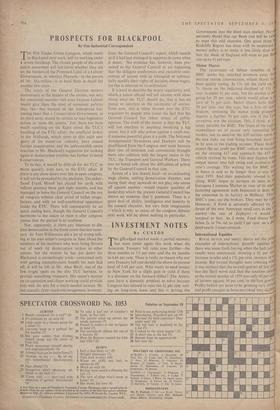PROSPECTS FOR BLACKPOOL
By Our Industrial Correspondent
THIS 91st Trades Union Congress, which meets in Blackpool next week, will be working under a severe handicap. The chosen people of the trade union movement will not know whether they are on the borders of the Promised Land of a Labour Government, or whether Pharaoh—in the person of Mr. Macmillan--is to hold them in thrall for another five years.
The result of the General Election matters enormously to the leaders of the unions, not only for emotional reasons—nor even because Labour would give them the kind of economic policies they like—but because of the widespread fear among them that a Conservative Government, in its third term, would he certain to take legislative action to 'tame the unions.' For there has' been much rumbling on the Right about the TUC's handling of the ETU affair; the unofficial strikes in the Midlands, which seem to dim each new glory of the motor-car industry, have caused further exasperation; and the unfavourable union reaction to M. Macleod's suggestion for looking again at demarcation troubles has further irritated Conservatives, To be.fair, it would be difficult for the TUC to move quickly, even now, in the ETU affair. If there is any show-down over this in open congress, it will not be provoked by the platform. The poker- faced Frank Haxell has played his cards with infinite patience these past eight months, and has managed to leave the General Council on the eve of congress withOut clear proof of ballot irregu- larities, and with no well-established opposition inside the ETU. There will consequently be no quick ending here, though the General Council's summons to the union to meet it after congress means that the pursuit is to continue.
Nor, apparently, is there any intention to dis- cuss demarcation in the frank terms that are neces- sary. Sir Tom Williamson did a lot of strong talk- ing at his own union's congress in June about the numbers of his members who were being thrown out of • work by demarcation strikes in other unions, but the motion he has put down for Blackpool is astonishingly weak—concerned only with getting unemployment benefit for men laid off. It will be left to Mr. Alan Birch, one of the few bright spots on the dim TUC horizon, to provide something visionary. His union's motion on co-operation and closer working could proVide him with the text for a much-needed sermon. He can scarcely draw much encouragement, however. from the General Council's report, which sounds as if it had just managed to suppress its yawn when it states: 'No evidence has, however, been pre- sented to the General Council as yet supposing that the delegate conferences and executive com- mittees of unions wish to relinquish or substan- tially modify their rights of decision about wages; yet this is inherent in co-ordination.'
It is hard to describe the weary superiority with which a union official will tell anyone with ideas about what the TUC should do, that it has no power to interfere in the autonomy of unions. Even now, this is often thrown into the ETU argument by people who resent the fact that the General Council has taken notice of public opinion. The truth of the matter is that the TUC will not interfere in anything involving a big union; but it will take action against a small one, if someone powerful gives it a push. The National Amalgamated Stevedores and Dockers will be disaffiliated from the Congress next week because their sins of omission and commission brought them into collision with the largest union in the TUC, the Transport and General Workers. There was no bored talk about the difficulties of action by the General Council in that case.
Action of a less drastic kind—in co-ordinating wage claims, settling demarcation disputes, and seeing their shop stewards do not play one union off against another—would require qualities of leadership which the present General .Council has shown no evidence that it possesses. There is a good deal of ability, intelligence and honesty in the council chamber, but very little imagination —which is why so many of the congress debates next week will be about nothing in particular.


































 Previous page
Previous page